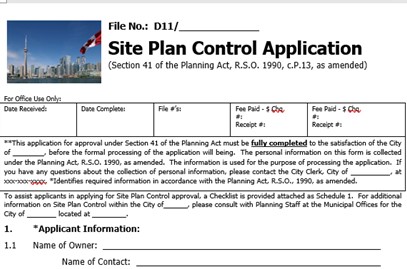[listmenu menu=”Top Menu”]

Site Plan Agreement Authority.
In Ontario the days are long past when your municipal building department could simply issue a new building permit in response to your application. The Ontario Planning Act has given municipalities the authority to require the property owner to apply for and then be bound by a Site Plan Agreement. A Site Plan Agreement can control almost every detail of your proposed new construction. This is a far broader authority than the municipality had when issuing a building permit. Building permit conditions are limited to zoning issues and the actual construction of the building itself. Site plan agreement details can include:
- access for pedestrians and vehicles
- walkways
- lighting
- waste facilities
- landscaping
- drainage
- exterior design
No Site Plan Agreement = No Building Permit.
Make no mistake, a site plan agreement is a municipal control tool. Meeting the potential conditions of a Site Plan Agreement under the last four points can involve consultation &/or approval by other organizations such as a local or regional Conservation authority, a Heritage Committee, the MTO, the Ministry of the Environment, etc. The process can seem like a maze. But, however slow and expensive you find the process, until you navigate the system you simply can’t get a building permit.
By-Pass the System
Some are tempted to by-pass the system and build without a permit. Such risk taking happens more frequently in rural parts of the province where municipal building, property standards or by-law inspectors rarely visit. Less often, I have seen the occasional construction of a fabric covered building in industrial parts of larger centres. This happens when the cost of Site Plan Agreement conditions equal or exceed the anticipated penalties for erecting a shelter without a permit.
Compelling Reasons for Compliance
Regardless of how tortuous the site plan agreement process may seem, there are compelling reasons to suffer through it:
- Municipalities have access to a Google Maps feature that alerts a building department to new construction. This permits the department to watch for any new construction that skipped around regulatory hoops.
- Even when the department doesn’t rely of Google maps, unfriendly neighbours are known to report unauthorized construction.
- The penalties for building without a permit are significant: as much as $50,000.00 for a first offence; up to $100,000.00 for further offences.
- As damaging as the short term cost of a fine is, the long term damage can be worse. A purchaser of your property may not close the sale if you can’t provide a building permit and other proof of municipal regulation compliance.
- Your neighbourhood will now have regular visits from Building and Property Standards Inspectors. These folks are paid to find infractions.
- Any application that you might belatedly make for a Site Plan Agreement or Building Permit on your current or future projects will be scrutinized to the nth degree. Think of your worst visit to a proctologist.
Site Plan Consultants Help
It doesn’t have to be this bad.
A site plan consultant can speed you through the process. The consultant will first determine if your property is subject to a Site Plan Agreement requirement. Your municipality may not require one. Alte3rnatively, your building type or size may qualify for an exemption. Fabric covered buildings, for example, are exempt in some Ontario rural counties.
Your consultant will likely know staff in the various municipal offices that will have direct input into any site plan agreement, primarily: Planning, Engineering, Roads and Building. Such familiarity can speed up the process based on a foundation of trust and past agreements. Even if your consultant is from out of town, the consultant will speak the same technical language as municipal staff to quickly establish credibility.
Site Plan Authority Limits
Your consultant will know the limits of Section 41 of the Planning Act (and section 114 of the City of Toronto Act,) and can restrain staff from requests beyond their authority. For example, requests that a certain material be used in constructing a building.
Most important, the consultant can speed the Site Plan Agreement process along. Most municipalities have timelines within which a department should respond to input requests for a development. The consultant will monitor these response times and help keep the department on track and on schedule. The municipal departments will know that your consultant knows their business and will tend to respond that much more crisply.
The time and, therefore, the money savings can be enormous.
Land Tribunal Appeals
Your consultant should also have the credibility and savoir faire to approach the City Solicitor if your site plan negotiations falter. The Planning Act provides that if the municipality fails to approve your site plan application within 30 days, you can appeal to the Ontario Land Tribunal or a local appeal body. A site plan appeal is the last thing that the City Solicitor needs added to his agenda. Your consultant can deal with the City Solicitor to help straighten matters out before an appeal becomes unavoidable.
Your site plan consultant will combine the best of a municipal lawyer, civil engineer, diplomat. With those skills in hand the discussion of fees should be straight forward. Some consultants charge by the hour; others by the job. If the charge is by the hour make sure that out-of-pocket expenses and travel time are discussed. If the charge is by the job inquire what the charges will be if the site plan application is ultimately rejected or abandoned.
The soft costs of a project can be high. It’s better to anticipate and prepare for them.
[listmenu menu=”Top Menu”]




